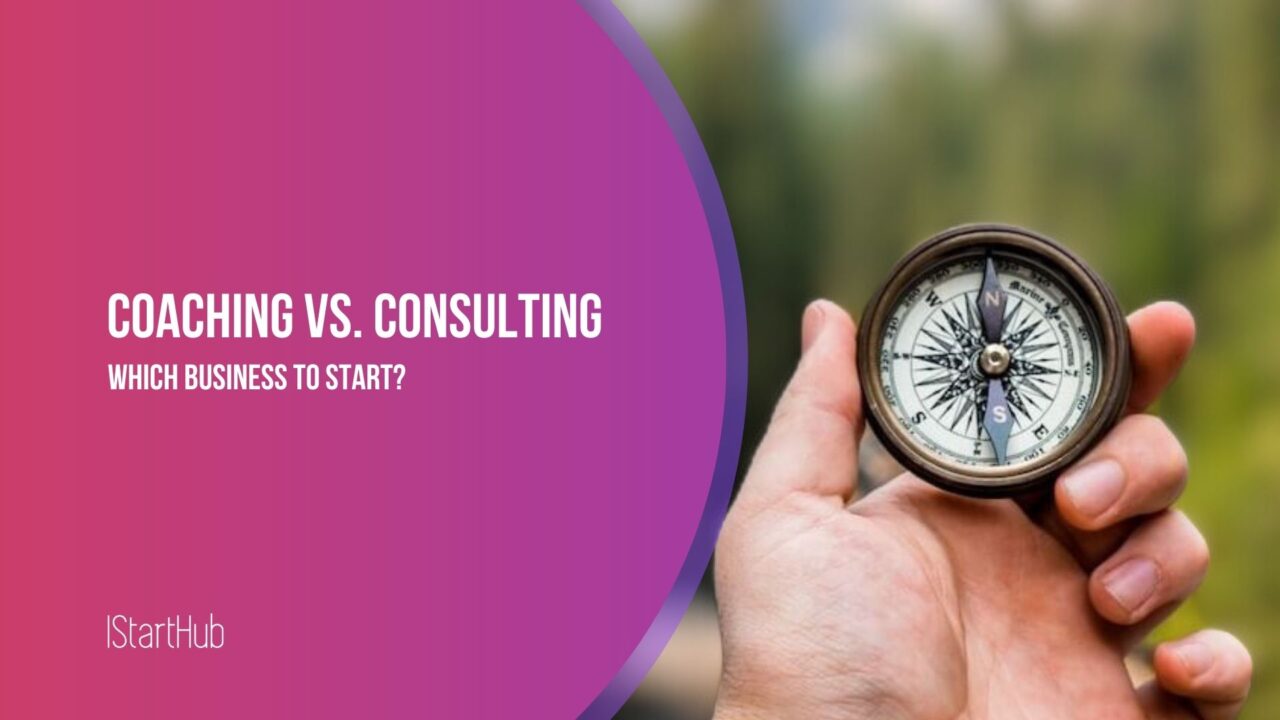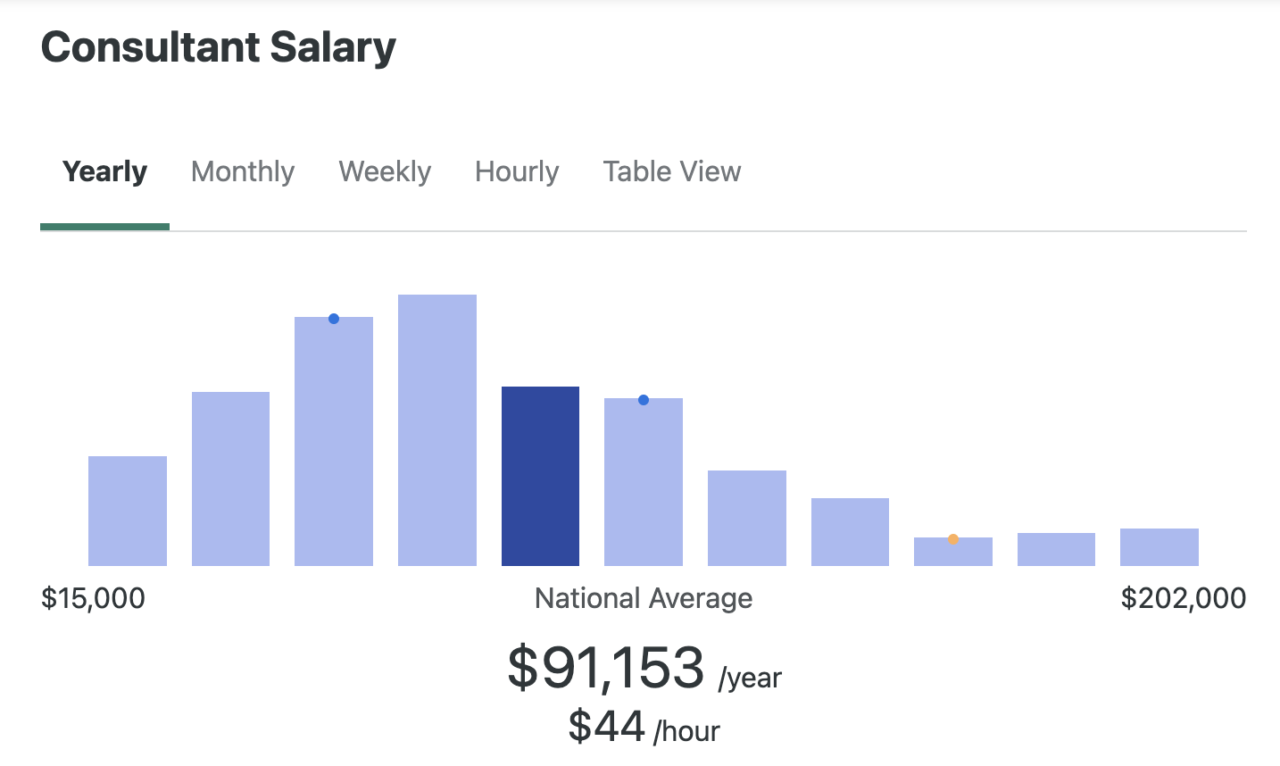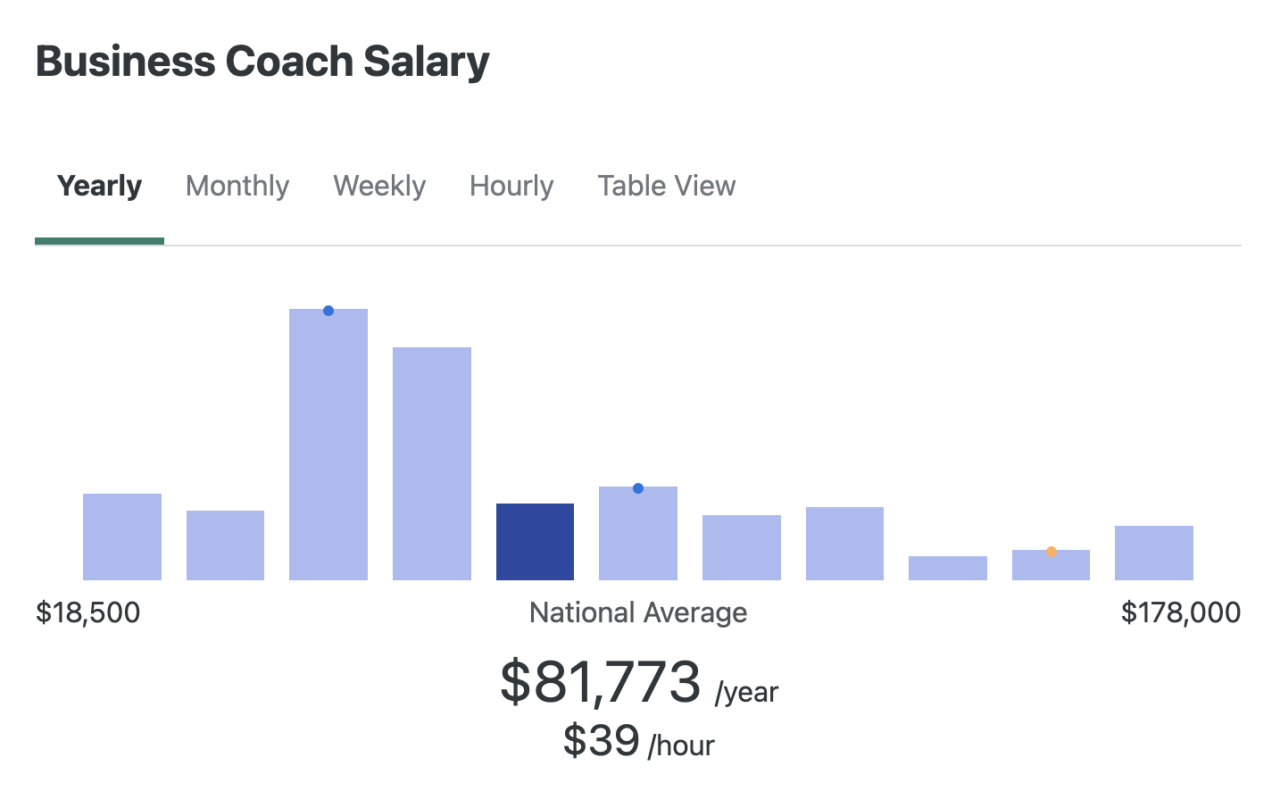Now Reading: Coaching vs. Consulting: Which Business To Start in 2023?
- 01
Coaching vs. Consulting: Which Business To Start in 2023?
Coaching vs. Consulting: Which Business To Start in 2023?

Coaching and consulting – are two terms that stir up quite a bit of confusion among those looking to offer business coaching and consulting services.
Are coaching and consulting the same? Can a coach be a consultant too? What differentiates a coach from a consultant?
Here’s the scoop: neither one is better than the other. And while people may use these terms interchangeably, they’re very different.
To determine the career path that best suits your skill sets and goals, you must first consider the similarities and differences between coaching and consulting.
By doing this, you will get valuable insights into the coaching and consulting domains and make an informed decision about the career path that resonates most with you.
Whether you envision yourself as a coach, a consultant, or perhaps even a combination of both, this knowledge will lay the groundwork for a flourishing online business that positively impacts the lives of others.
What is a consultant?
Think of consultants as problem-solving superheroes for businesses. They dive deep into a company’s structure or analyze a specific issue. They then use their experience and expertise to spot strengths and weaknesses and offer practical solutions.
Similar to detectives, consultants are quick to recognize patterns and apply their know-how to the situation at hand.
So what’s their job?
To offer advice, build skills, and help organizations tackle problems head-on.
For instance, imagine an IT consultant swooping in to assess a company’s network security and suggest ways to avoid cyber threats.
Or picture a human resources consultant stepping in to revamp recruitment strategies and make hiring a breeze. They’re all about results and making clients happy by recommending an effective way of solving the problems they agree upon.

The average annual pay for a Consultant in the United States amounts to $91,153, which translates to a rate of about $43.82 per hour.
Consultants often specialize in specific industries, bringing a boatload of knowledge to the table.
What is a business coach?
Coaches have a vital job: To help clients kick their progress into high gear, catapult clients toward success, and keep them moving forward. They guide clients in solving problems and finding better solutions.
Coaching revolves around creating a safe, confidential, and non-judgmental space where individuals can freely explore their challenges and strengths, grow and learn.
With their arsenal of coaching techniques like active listening, powerful questioning, and constructive feedback, coaches help people gain self-awareness, clarify aspirations, and overcome obstacles.
They also serve as accountability partners, keeping clients motivated and offering unwavering support every step of the way. As such, the relationship between a coach and their client is often a close and intimate one.
Unlike consultants who deliver ready-made solutions, coaches are mediators. They shake things up, challenge the status quo, and stir up discussions that’ll spur the client to take action and make a change.

The average annual salary of a Business Coach in the United States is about $81,773 a year or $39.31 an hour.
However, this depends on factors like experience, location, and number of clients.
Coaching vs. Consulting
Coaching and consulting operate in the same arena, but they offer different pathways to success. In this section, we discuss both the similarities and distinctions that exist between these two services.
Coaching vs consulting – top similarities
Goal and result oriented
Coaching and consulting may walk different paths, but they share common ground in their mission to drive businesses and individuals toward their goals. At the core, both coaching and consulting are fueled by a passion for helping clients unlock their full potential and achieve desired outcomes.
Expertise and guidance
Both coaching and consulting involve leveraging expertise and providing guidance to clients. Coaches bring their knowledge, skills, and experience to empower clients, offering insights, tools, and personal or professional growth strategies. Similarly, consultants offer specialized expertise and wisdom to analyze problems, develop solutions, and provide expert guidance to enhance business performance.
Client-focused
Both coaches and consultants prioritize their clients’ objectives above all else. They dedicate significant energy and resources to support their clients in unlocking their success, acting as staunch advocates for their client’s interests.
Not mutually exclusive
Coaching and consulting have the potential to overlap or complement each other seamlessly. Consultants excel at delving into conceptual depths and delivering well-crafted suggestions, while coaches provide gentle nudges and motivation. Embracing both coaching and consulting is entirely acceptable, as businesses can harness the unique benefits of each approach for maximum impact.
Coaching vs consulting – top differences
Focus: inner development vs. problem resolution
Coaches focus on harnessing the client’s inner abilities and facilitating their improvement.
In contrast, consultants prioritize addressing immediate problem areas. This often translates into a more data-driven approach for consultants, yielding quantifiable results that are easier to measure.
Approach: unveiling truth vs. guided execution
A critical distinction between coaching and consulting lies in their approach. Coaches aim to unearth answers from within the client, enabling them to discover their own truth.
Meanwhile, consulting provides direct guidance, offering clients specific instructions on what to do.
As a coach, you must equip clients with strategies to uncover their truths independently. Meanwhile, consultants merely give clients tools to facilitate forward movement and execution.
Questioning: curiosity vs. information gathering
Coaches excel in asking questions, but so do consultants. However, the difference lies in their “why.” Consultants typically adopt an “information gathering” mode when posing questions, while coaches naturally exude curiosity.
This innate curiosity is a valuable asset that makes working with a coach beneficial.
Although clients hire coaches and consultants for their expertise, they may initially hesitate to share their business problems. Often, they try to conceal issues to maintain a favorable image. However, clients tend to open up and willingly respond to questions when interacting with a naturally curious coach
Expertise: internal vs. external
Coaches recognize the client as the expert in their own business. As such, they simply employ active inquiry and thought-provoking questions to empower clients to solve their own problems.
On the other hand, people view consultants as the experts and, thus, the ones with all the answers.
As such, coaches tend to bring about meaningful and enduring changes, both in the short and long term. Consultants, however, tend to provide short-term solutions to specific problems.
Solutions: delivering vs. discovering
Both coaches and consultants are experts in their own rights. However, when and how they share their knowledge differ.
Coaching involves guiding clients to explore various possibilities and uncovering hidden potential they may not have recognized.
On the other hand, consulting entails leveraging your knowledge and experience to deliver specific options and recommendations to clients.
Consultants share their expertise immediately, while coaches take out time to understand what their clients want and what’s happening in their situation. Once they have the necessary information, coaches strategically offer their expertise and guide clients toward their goal
Kind of change: behavioral vs. industry specific
Most people choose a coach when they want to make behavioral changes like improving their time management habits or becoming better leaders. However, consulting tends to focus more on industry-specific solutions than personal behaviors. Also, Coaches often adapt their approach to each client, while consultants may use similar solutions across different cases.
Contact Person: singular focus vs. collaborative engagement
A consultant often collaborates with multiple individuals within a team, group, board, or department, even if a single person or company contracts them.
Coaches, however, primarily work one-on-one, occasionally extending their support to entire teams. This individualized approach enables coaches to significantly impact employees by helping them improve personally, which can have a transformative effect.
FAQs
Coaching or consulting – which is better for me?
The choice between coaching and consulting depends on your specific skill set. Choose to coach if you enjoy guiding others, helping them discover their solutions, and facilitating personal growth.
Opt for consulting if you excel at providing expertise, offering specialized solutions, and solving specific business challenges.
Consider your strengths, interests, and the type of client interaction you prefer. Ultimately, go with the path that aligns best with your skills and passion.
What is the difference between training and coaching?
Usually, training focuses on imparting knowledge and developing specific skills through structured learning activities. It follows a directive approach, with trainers providing information and leading exercises to a group of learners.
Conversely, coaching guides individuals to unlock their potential, set and achieve goals, and overcome obstacles through a collaborative and individualized approach.
Coaches ask powerful questions and facilitate self-reflection in a one-on-one or small group setting. Training emphasizes skill development, and coaching focuses on personal growth and achieving specific goals through guidance and support.
Final thoughts
In the corporate arena, where strategies and tactics reign supreme. Therefore choosing between becoming a coach or a consultant can be confusing.
Coaching may be the path for you if you enjoy guiding others, helping them discover their own solutions, and fostering personal growth. As a coach, you’ll empower individuals, ask thought-provoking questions, and facilitate their journey toward self-improvement.
However, if you excel at providing expert advice, problem-solving, and delivering tangible results, consulting might be your calling. As a consultant, you can use your specialized knowledge and experience to address specific business challenges and drive organizational success.
Reflect on your innate abilities, interests, and desired outcomes. Think about what type of impact you want to make or what kind of work energizes you. Both coaching and consulting have unique merits, so trust your instincts and choose the path that aligns with your passion and goals.
Tetiana is a business coach and owner of IStartHub, a business media for ambitious female entrepreneurs and small business owners.





















